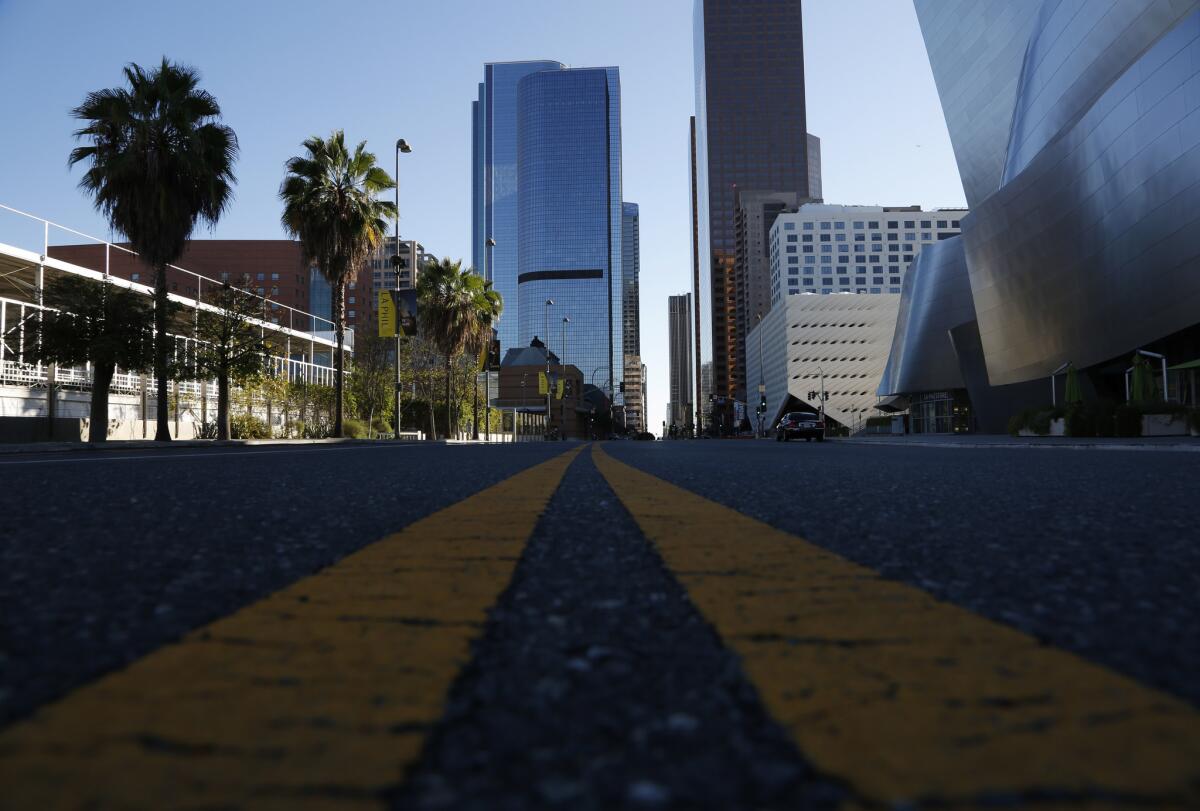As the Broad museum opens, a broader look at Grand Avenue development

The Walt Disney Concert Hall, right, and The Broad museum, second from right, as seen from middle of Grand Avenue in downtown Los Angeles.
- Share via
For years, local leaders have worked to transform upper Grand Avenue in downtown Los Angeles into a major cultural and tourist destination — to mixed degrees of success.
The opening of the Broad this month will mark a major evolutionary leap forward in this long, sometimes agonized process. Some local politicians are praising the $140-million museum as a welcome addition to the roughly mile-long stretch that also includes the Music Center, the Museum of Contemporary Art and Grand Park.
But the completion of the Grand Avenue Project hinges on the still-unrealized $950-million commercial development, designed by architect Frank Gehry, that would serve as the centerpiece to the area’s nightlife.
The mixed-used complex, developed by the New York-based Related Cos., would sit across the street from Walt Disney Concert Hall on what is known as Parcel Q — currently parking structures — and feature a 300-room, four-star hotel and residential units as well as retail and restaurant space.
For visitors planning to check out the Broad, the complex would provide dining and hotel options in the Bunker Hill area that has for years been lacking on both fronts.
“It’s not only going to provide for Grand Avenue, it’s going to provide for all of downtown,” said Councilman Jose Huizar, who represents the 14th District, which includes downtown L.A.. He also sits on the Grand Avenue Authority, the panel of city and county officials that oversees the development of the project.
He said it is incumbent on the authority to “find the connectivity — more walkways, better public transit — to connect Grand Avenue to the rest of downtown. We need to make those connections easier for people who visit.”
Related had first hoped to break ground in 2007, but the Great Recession caused delays. After an early design that local officials rejected in 2013 for being unimaginative, Gehry submitted his vision, which includes two high-rise towers, and was approved the following year.
The development continues to evolve. This year, Related parted ways with SBE Entertainment, which would have run an SLS Hotel on the premises. Related later announced that Equinox will operate the hotel.
The high-end gym company, majority-owned by Related, has recently begun branching into the hospitality market.
The Grand Avenue Authority met this month to discuss approval of the Equinox-branded hotel. County Supervisor Hilda Solis, who chairs the authority, has expressed concern over the use of public subsidies to cater to upscale clientele. The city is expected to give tens of millions of dollars in financial assistance to the Grand Avenue Project.
Solis, whose 1st District includes parts of downtown as well as areas east, including East L.A., declined a request for an interview but said in a statement that “it is a priority to me that the cultural destinations on Grand Avenue, including the Music Center and the Broad, remain accessible to all residents of Los Angeles County, regardless of their socio-economic level.”
Huizar said he initially had concerns about Equinox because it is new to the hotel business.
“I’m now comfortable that it’s a good fit for Grand Avenue,” he said. “They’ve put together a good team ... and I think it will attract new people to downtown.”
There is no announced date of completion for the commercial complex. In a statement, Related said the complex will include “market rate and affordable residential units” and added that it expects the Broad “will attract Angelenos as well as visitors from around the world.”
The opening this month of the Broad follows the 2012 unveiling of Grand Park, a public recreation area that hosts live performance events and stretches from Grand Avenue at the north to Spring Street at the south.
The total cost of the Grand Avenue Project is estimated at close to $2 billion, according to a 2014 analysis from the L.A. County Economic Development Corp., a private, nonprofit organization created by the County Board of Supervisors to promote business growth.
It is expected to generate $500.7 million in annual business revenue and $62.5 million in state and local taxes.
Councilman Curren D. Price Jr., who represents the 9th District, which includes parts of downtown, called the project a “public-private” partnership and said he was glad that the private portion is seeing movement.
“The arts culture is an important part of our DNA, and this museum [the Broad] will be a destination that will not only benefit the downtown neighborhood but the city as a whole,” he said.
Related said in a statement that plans for the commercial complex have been crafted “entirely around public access,” adding that it is committed to “a mix of retail and food offerings to serve a diverse audience with inclusion of local operators at approachable price points.”
The cultural development of Grand Avenue has personal meaning for Supervisor Sheila Kuehl.
“When I was a little girl, everyone went downtown for their cultural events and shopping,” said Kuehl, who represents the county’s 3rd District. “One of the things I loved about downtown was that it was open to a lot of people. I took public transit.”
She believes that commercial development is important but doesn’t always serve the broadest segment of the population. “One of the major anchors of downtown should be arts and culture. I think the Broad is an important addition to that vibrancy.”
Twitter: @DavidNgLAT
More to Read
The biggest entertainment stories
Get our big stories about Hollywood, film, television, music, arts, culture and more right in your inbox as soon as they publish.
You may occasionally receive promotional content from the Los Angeles Times.











